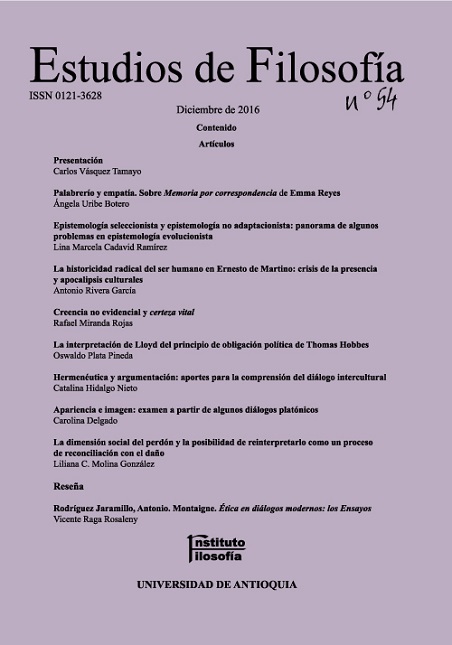Lloyd’s Interpretation of the Principle of Political Obligation of Thomas Hobbes
DOI:
https://doi.org/10.17533/udea.ef.n54a06Keywords:
Hobbes, Lloyd, conflict, prudential interests, transcendent interestsAbstract
This essay presents Sharon Ann Lloyd’s interpretation of Thomas Hobbes’s political theory and exposes the arguments that she offers to support the thesis that argues that the standard interpretation is unable to understand its real problem: the problem of establishing and maintaining social order.
Downloads
References
Carmichael. D. J. C. (1983). C. B. Macpherson’s “Hobbes”: A Critique, en: The Canadian Journal of Economics and Political Science. 16, 1, p. 61-80.
Darwall, S. (1994). Ideals as Interests in Hobbes’s Leviathan: The Power of Mind Over Matter. Cambridge: Cambridge University Press.
Gauthier, D. (1969). The Logic of Leviathan: The Moral and Political Theory of Thomas Hobbes. London: Oxford Clarendon Press.
Gauthier, D. (1979). Thomas Hobbes: Moral Theorist, en: The Journal of Philosophy. 76, 10: p. 547-559.
Gauthier, D. (1987). Taming Leviathan Hobbes, en: Philosophy & Public Affairs. 16, 3 p. 280-298.
Hampton, J. (1986). Hobbes and the Social Contract Tradition. Cambridge: Cambridge University Press.
Hobbes, T. (1990). Behemoth, or the Long Parliament. Reprint of the 1889 Tönnies edition, with introduction by Stephen Holmes. Chicago: Chicago University Press.
Hobbes, T. (1994). Leviatán: La materia, forma y poder de un estado eclesiástico y civil. Trad. Carlos Mellizo. Madrid: Alianza.
Hobbes, T. (2010). Behemoth. Clarendon Edition of the Works of Thomas Hobbes. Oxford University Press. Oxford. En castellano: Behemoth. Madrid: Editorial Tecnos, 1992.
Kavka, G. (1983). Hobbes’s War of All Against All, en: Ethics. 93, 2, p. 291-310.
Kavka, G. (1986). Hobbesian Moral and Political Theory. Princeton: Princeton University Press.
Lloyd, S. (1992). Ideals as Interests in Hobbes’s Leviathan. Cambridge: Cambridge University Press.
Lloyd, S. (2009). Morality in the Philosophy of Thomas Hobbes: Cases in the Law of Nature. Cambridge: Cambridge University Press.
Lloyd, S. (1945). The Two Gods of Leviathan: Thomas Hobbes on Religion and Politics. Cambridge: Cambridge University Press.
Macpherson, C. (1945). Hobbes Today, en: The Canadian Journal of Economics and Political Science. 11, 4, p, 524-534.
Macpherson, C. (1970). La teoría política del individualismo posesivo. De Hobbes a Locke. Barcelona: Editorial Fontanella.
Malcolm, N. (1995). Hobbes and Spinoza. En: J. H. Burns (ed.). The Cambridge History of Political Thought 1450-1700. Cambridge: Cambridge University Press.
Malcolm, N. (2005). What Hobbes really said, The National Interest, Washington, pp. 81.
Malcolm, N. (2007). Reason of State, Propaganda and the Thirty Years’ War. An Unknown Translation by Thomas Hobbes. Oxford: Oxford University Press.
Martinich A. P. (1994). The Philosophical Review, Vol. 103, No.4, pp. 748-752.
Rosler, A. (2009). Hobbes y la autonomía de la política, en: Doispontos, Curitiba, São Carlos, vol. 6, n. 3 – especial, pp.11-33.
Rosler, A. (2009). Hobbes y la autonomía de la política. En: Doispontos, Curitiba, São Carlos, vol. 6, n. 3.
Skinner, Q. (1997). Reason and Rhetoric in the Philosophy of Hobbes. Cambridge: Cambridge University Press.
Venezia, L. (2013). Lloyd’s Orthodoxy, en: Hobbes Studies, 6(2) 171-184.
Published
How to Cite
Issue
Section
Categories
License
Copyright (c) 2016 Oswaldo Plata Pineda

This work is licensed under a Creative Commons Attribution-NonCommercial-ShareAlike 4.0 International License.
Authors who publish with this journal agree to the following terms:
1. The Author retains copyright in the Work, where the term "Work" shall include all digital objects that may result in subsequent electronic publication or distribution.
2. Upon acceptance of the Work, the author shall grant to the Publisher the right of first publication of the Work.
3. The Author shall grant to the Publisher a nonexclusive perpetual right and license to publish, archive, and make accessible the Work in whole or in part in all forms of media now or hereafter known under a Creative Commons Attribution-NoCommercia-ShareAlike (CC BY-NC-SA 4.0), or its equivalent, which, for the avoidance of doubt, allows others to copy, distribute, and transmit the Work under the following conditions: (a) Attribution: Other users must attribute the Work in the manner specified by the author as indicated on the journal Web site;(b) Noncommercial: Other users (including Publisher) may not use this Work for commercial purposes;
4. The Author is able to enter into separate, additional contractual arrangements for the nonexclusive distribution of the journal's published version of the Work (e.g., post it to an institutional repository or publish it in a book), as long as there is provided in the document an acknowledgement of its initial publication in this journal;
5. Authors are permitted, and Estudios de Filosofía promotes, to post online the preprint manuscript of the Work in institutional repositories or on their Websites prior to and during the submission process, as it can lead to productive exchanges, as well as earlier and greater citation of published work (see The Effect of Open Access). Any such posting made before acceptance and publication of the Work is expected be updated upon publication to include a reference to the Estudios de Filosofía's assigned URL to the Article and its final published version in Estudios de Filosofía.















